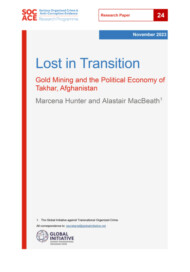
05 Dec 2023
Monitoring the evolution of the illicit economy in Afghanistan
CSA-Obs
Thi was the Managing Editor of the LSE Press‘s Journal of Illicit Economies and Development (JIED) and Analyst at the Global Initiative Against Transnational Organized Crime (GI-TOC). Thi has been also coordinating and managing the International Association for the Study of Organized Crime (IASOC)‘s activities such as IASOC annual prizes, events, monthly bulletins, and the 24-hour conference on organized crime (OC24).
Thi worked on and co-coordinates the Responsible & Ethical Business Coalition against Trafficking (RESPECT) Initiative, which serves as a platform for thought leaders, practitioners, and policy makers and to mobilise the business community as a strategic partner to tackle human trafficking. Her other projects include the Modern Slavery Map, an interactive map for business of anti-human trafficking organisations, and the Tech Against Trafficking initiative, a coalition of technology companies and stakeholders aiming to help eradicate human trafficking using technology, where Thi is its Research Lead.
Thi also worked on and coordinated the Drugs & Development Hub (DDH) initiative, jointly launched by the London School of Economics (LSE), the Global Partnership on Drug Policies and Development (GPDPD), and GI-TOC to create new perspectives for integrated drug policies.
Her main areas of interest are human development – especially equity in education and healthcare, women’s empowerment; trafficking of children and women; poverty and humanitarian emergencies. Her regional interests are South Eastern Asia and Africa. She has supported the Global Poverty Project (now Global Citizen) in Wellington, New Zealand; the Austrian Red Cross, Supertramps in Vienna.
She is a member of the European Consortium for Political Research (ECPR)‘s Standing Group on Organised Crime (SGOC), and a member of the European Society of Criminology. Thi is supporting the Regional Academy on the United Nations (RAUN) as a Programme Coordinator and the Pacific Links Foundation as a Regional Advisor in her personal capacity.
Thi speaks four languages: Vietnamese (mother tongue), English (professional proficiency), Chinese – Mandarin (intermediate) and German (intermediate).